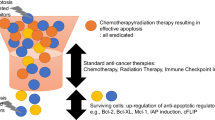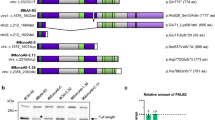Abstract
The influence of the human tumor suppressor PTEN on sensitivity of tumor cells to cytostatic drugs was studied. Rat ras-transformed (N-ras Asp12) fibroblasts were stably transfected with a full-size PTEN gene. Transfected clone was characterized by an enhanced expression of PTEN and a more normal phenotype in comparison with the parental cells. The effect of transient transfection with PTEN on the sensitivity of several malignant cell lines to the cytostatic drugs colchicine and adriablastine was studied. These drugs differ from each other in action mechanisms and intracellular targets. The tumor cell lines tested in this study included parental cell lines and stable sublines possessing drug resistance due to overexpression of P-glycoprotein. In all cell lines, introduction of exogenous PTEN caused a decrease in proliferation rates. This indicated that transgene was active. The chemosensitivity of some drug-resistant sublines was changed after PTEN transfection, but the drug sensitivity of parental cell lines remained unaffected. The effect of PTEN overexpression on chemosensitivity of malignant cells to cytostatic drugs was found to depend both on their mechanisms of action and on the origin of transfected cells. Our data suggest that PTEN is involved into the molecular mechanisms of drug resistance in cells studied.
Similar content being viewed by others
References
Hanahan, D. and Weinberg, R.A., The hallmarks of cancer, Cell, 2000, vol. 100, pp. 57–70.
Kanamori, Y., Kigawa, J., Itamochi, H., et al., Correlation between loss of PTEN expression and Aktphosphorylation in endometrial carcinoma, Clin. Cancer Res., 2001, vol. 7, pp. 892–895.
Uegaki, K., Kanamori, Y., Kigawa, J., et al., PTEN-positive and phosphorylated-Akt-negative expression is a predictor of survival for patients with advanced endometrial carcinoma, Oncol. Rep., 2005, vol. 14, pp. 389–392.
Tsutsui., S., Inoue, H., Yasuda, K., et al., Reduced expression of PTEN protein and its prognostic implications in invasive ductal carcinoma of the breast, Oncology, 2005, vol. 68, pp. 398–404.
Eng, C., PTEN: One gene, many syndromes, Hum Mutat., 2003, vol. 22, no. 3, pp. 183–198.
Stambolic, V., Suzuki, A., de la Pompa, J.L., et al., Negative regulation of PKB/Akt-dependent cell survival by tumor suppressor PTEN, Cell, 1998, vol. 95, pp. 29–39.
Khramtsova, S., Stromskaya, T., Potapova, G., et al., Human p53, mutated at codon 273, causes distinct effects on nucleotide biosynthesis salvage pathway key enzymes in Rat-1 cells and in their derivatives activated ras Oncogene, Biochem. Biophys. Res. Comm., 1993, vol. 194, no. 1, pp. 383–390.
Deichman, G.I., Kluchareva, T.E., Matveeva, V.A., et al., Clustering of discrete cell properties essential for tumorigenicity and metastasis. III. Dissociation of the properties in N-ras-transfected RSV-SR-transformed cells, Int. J. Cancer, 1992, vol. 51, pp. 903–908.
Akiyama, S.-I., Fojo, A., Hanover, J.A., et al., Isolation and genetic characterization of human KB cell lines resistant to multiple drugs, Somatic Cell Molec. Genet., 1985, vol. 11, pp. 117–126.
Chen, Y.N., Mickley, L.A., Schwartz, A.M., et al., Characterization of adriamicyn-resistant human breast cancer cells which display overexpression of a novel resistance-related membrane protein, J. Biol. Chem., 1990, vol. 265, no. 17, pp. 10073–10083.
Chaudhary, P.M. and Roninson, I.B., Activation of MDR1 (P-glycoprotein) gene expression in human cells by protein kinase-C agonists, Oncol. Res., 1992, vol. 4, pp. 281–290.
Vaiman, L.V., Stromskaya, T.P., Rybalkina, E.Yu., et al., Intracellular localization and content of YB-1 protein in multidrug resistant tumor cells, Biochemistry (Mosc)., 2006, vol. 71, pp. 190–200.
Tolkacheva, T. and Chan, A.M., Inhibition of H-Ras transformation by the PTEN/MMAC1/TEP1 tumor suppressor gene, Oncogene, 2000, vol. 19, no. 5, pp. 680–689.
Tsao, H., Zhang, X., Fowlkes, K., and Haluska, F.G., Relative reciprocity of NRAS and PTEN/MMAC1 alterations in cutaneous melanoma cell lines, Cancer Research, 2000, vol. 60, no. 7, pp. 1800–1804.
Lee, J.T.Jr., Steelman, L.S., and McCubrey, J.A., Phosphatidylinositol 3′-kinase activation leads to multidrug resistance protein-1 expression and subsequent chemoresistance in advanced prostate cancer cells, Cancer Research, 2004, vol. 64, pp. 8397–8404.
Tanaka, M., Koul, D., Davies, M.A., et al., MMAC1/PTEN inhibits cell growth and induces chemosensitivity to doxorubicin in human bladder cancer cells, Oncogene, 2000, vol. 19, pp. 5406–5412.
Huang, H., Cheville, J.C., Pan, Y., et al., PTEN induces chemosensitivity in PTEN-mutated prostate cancer cells by suppression of Bcl-2 expression., J. Biol. Chem., 2001, vol. 276, pp. 38830–38836.
Goswami, A., Ranganathan, P., and Rangnekar, V.M., The phosphoinositide 3-kinase/Akt1/Par-4 axis: A cancer-selective therapeutic target, Cancer Research, 2006, vol. 66, no. 6, pp. 2889–2892.
Huiling, Y., Yu-Ye, W., Lin, Y.L., Fournier, K., et al., DNA damage-induced protein 14-3-3 S inhibits protein kinase B/Akt activation and suppresses Akt-activated cancer, Cancer Research, 2006, vol. 66, no. 6, pp. 3096–3105.
Furnari, F.B., Huang, H.J., and Cavenee, W.K., The phosphoinositol phosphatase activity of PTEN mediates a serum-sensitive G1 growth arrest in glioma cells, Cancer Research, 1998, vol. 58, no. 22, pp. 5002–5008.
Zhu, X., Kwon, C.H., Schlosshauer, P.W., et al., PTEN induces G1 cell cycle arrest and decreases cyclin D3 levels in endometrial carcinoma cells, Cancer Research, 2001, vol. 61, pp. 4569–4575.
Saga, Y., Mizukami, H., Suzuki, M., et al., Overexpression of PTEN increases sensitivity to SN-38, an active metabolite of the topoisomerase I inhibitor irinotecan, in ovarian cancer cells, Clinical Cancer Research, 2002, vol. 8, pp. 1248–1252.
Yan X., Fraser M., Qiu Q., and Tsang, B.K., Over-expression of PTEN sensitizes human ovarian cancer cells to cisplatin-induced apoptosis in a p53-dependent manner, Gynecol. Oncol., 2006, vol. 102, no. 2, pp. 348–355.
Author information
Authors and Affiliations
Additional information
Original Russian Text © E.A. Shcherbakova, T.P. Stromskaya, E.Yu. Rybalkina, A.A. Stavrovskaya, 2007, published in Biologicheskie Membrany, 2007, Vol. 24, No. 3, pp. 218–225.
Rights and permissions
About this article
Cite this article
Shcherbakova, E.A., Stromskaya, T.P., Rybalkina, E.Y. et al. Influence of human tumor suppressor PTEN on sensitivity of malignant cells to anticancer drugs. Biochem. Moscow Suppl. Ser. A 1, 123–129 (2007). https://doi.org/10.1134/S1990747807020043
Received:
Issue Date:
DOI: https://doi.org/10.1134/S1990747807020043




